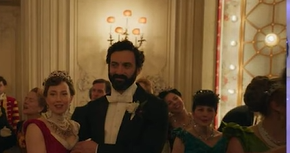Title: The Unveiling of Power: Tucker McCall as Aristotle Dumas in The Young and the Restless
In the shadowed world of The Young and the Restless, where ambition and desire intertwine like a tangled web, the mysterious figure of Aristotle Dumas has captivated fans and characters alike. For weeks, viewers have speculated about the enigmatic relationship between Billy Abbott and this elusive persona, eagerly awaiting the moment the two would finally collide. That moment arrived with a dramatic twist — Tucker McCall, a familiar fixture in Genoa City, is revealed to be the very man Billy has been seeking. This revelation not only reshapes the narrative landscape of the show but also sets the stage for a complex exploration of power, betrayal, and the dark allure of ambition as the boundaries between ally and adversary begin to blur.
For Billy Abbott, the anticipation of meeting Aristotle Dumas generated an atmosphere thick with tension and unease. Each rescheduled meeting only served to deepen his frustration, as he navigated a labyrinth of subterfuge that seemed to challenge his very sense of self. A man who thrives on control, Billy found himself caught in a storm of emotions, his need for clarity and confrontation spiraling into a desperate frenzy as he arrived at a seemingly unremarkable park. Yet, instead of the mysterious figure he expected, a face known to him emerged from the shadows — Tucker McCall. This meeting, laden with unspoken intentions, was not merely a confrontation; it was an unveiling that would change the course of their fates.
As the truth unfolded, it became clear that Tucker, under the guise of Aristotle Dumas, represented a significant shift in the power dynamics of Genoa City. His history of deception and reinvention, marked by cunning strategy and emotional manipulation, adds layers of complexity to this revelation. Not simply a pawn in someone else’s game, Tucker plays multiple roles — mentor, manipulator, and master strategist, inviting Billy to step into a darker side of himself that he had long suppressed. This invitation triggers an internal struggle within Billy, who, despite his initial resistance, finds himself tempted by the seductive promise of power that Tucker lays before him. Yet, this temptation is laced with a chilling realization: embracing this darker path could irrevocably consume him.
The presence of Audra Charles during this pivotal encounter cannot be overlooked. Her calm demeanor and insightful observations serve as a catalyst for the unfolding drama, expertly navigating the power play between Tucker and Billy. Audra represents the intersection of intelligence and emotional acuity, confirming that the meeting was not a mere fluke but part of a meticulously orchestrated maneuver. Her ability to influence the dynamics between Tucker and Billy illustrates the strategic depth of the narrative. While Tucker aims to draw Billy into a world of calculated chaos, her role adds a layer of intrigue, suggesting that the stakes are higher than either man anticipates. She does not simply observe; she shapes the unfolding reality, hinting at her own ambitions and alliances.
In the background of this intense exchange, the implications for the Abbott family are profound. As Jack and Kyle remain blissfully unaware of the storm brewing within their ranks, the power shifts set into motion by Tucker’s revelation threaten to fracture the family’s already delicate alliances. Billy, once the peacemaker, now finds himself at a crossroads where the allure of dominance clashes with familial loyalty. The Abbott family legacy, built on trust and mutual respect, teeters on the brink of collapse as Billy grapples with a choice: to uplift his family or to sever ties and pursue an unchecked ambition that could reshape their very foundation. As Jack clings to the hope of preserving their legacy and Kyle struggles for legitimacy, Billy’s descent into the shadows complicates every relationship, creating a ticking clock for alliances that could crumble under the weight of betrayal.
Ultimately, the drama lies not only in the machinations of Tucker as Aristotle but also in Billy’s internal conflict. The seductive pull of power and the promise of freedom from past constraints resonate deeply within him, awakening a darker side that has always lingered just beneath the surface. In a world where betrayal is currency and ambition often leads to destruction, Billy stands at a precipice. Will he embrace this new identity, aligning himself with the manipulative Tucker, or will the weight of his familial loyalty anchor him back from the edge? The chilling truth is that the answer is far from simple; in The Young and the Restless, the lines between right and wrong blur, revealing that staggering ambition can come with a price that may alter the very essence of who one is.
As the tale of Tucker McCall and Billy Abbott unfolds, it beckons the audience into the shadowy recesses of ambition, self-discovery, and the struggle for power. Viewers are left hanging on the edge of their seats, eagerly anticipating the next move — a testament to the intoxicating nature of The Young and the Restless, where nothing is ever as it seems, and power can turn allies into adversaries in the blink of an eye. Billy must confront not only Tucker’s dark influence but also the monster of ambition awakening within himself, and in doing so, .he becomes a potent reflection of the dangers of unrestrained desire. In Genoa City, the narrative is just beginning, and the consequences of every choice will resonate long after the curtain falls.





